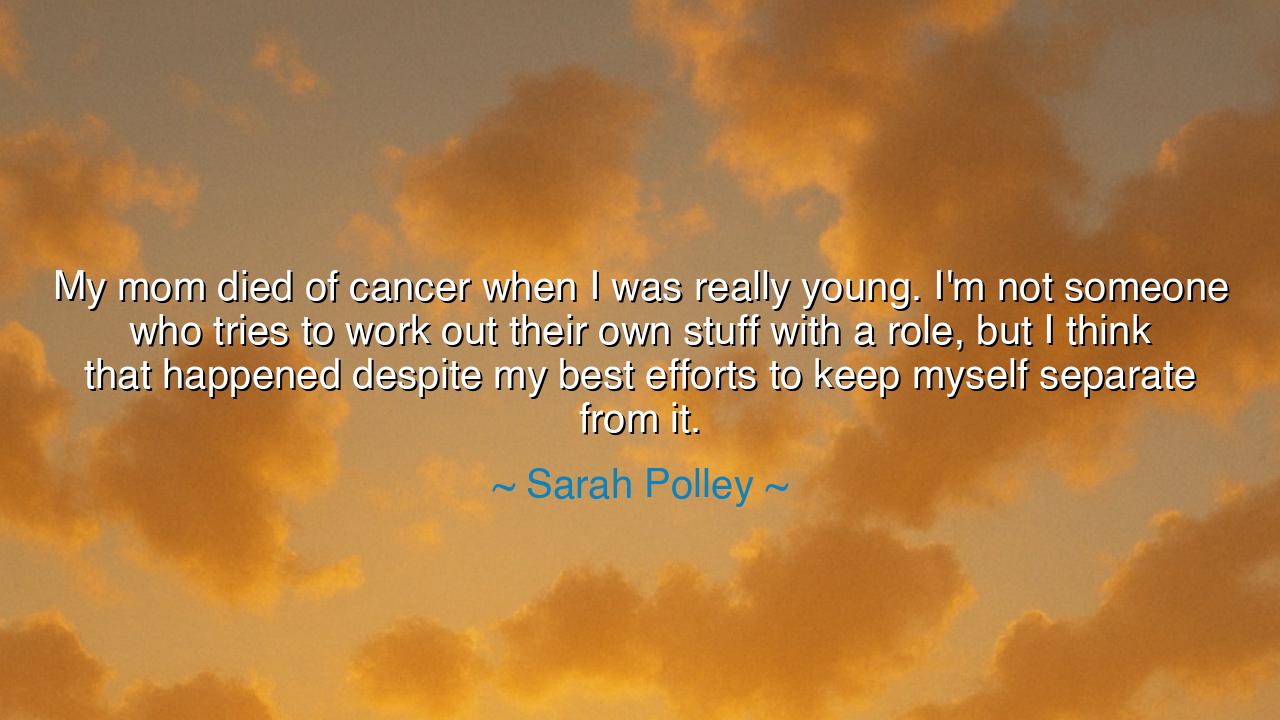
My mom died of cancer when I was really young. I'm not someone
My mom died of cancer when I was really young. I'm not someone who tries to work out their own stuff with a role, but I think that happened despite my best efforts to keep myself separate from it.






“My mom died of cancer when I was really young. I’m not someone who tries to work out their own stuff with a role, but I think that happened despite my best efforts to keep myself separate from it.” — Sarah Polley
In these words of Sarah Polley, we hear not only the voice of an artist but of a soul who has wrestled with loss — a loss so formative that it became the quiet undercurrent of her being. Her quote, simple yet profound, speaks to a truth that the ancients knew well: that grief, once it enters a heart, becomes a companion for life. It does not vanish; it transforms, shaping how we create, speak, and understand the world. When she says, “I think that happened despite my best efforts to keep myself separate from it,” she reveals the hidden wisdom that pain cannot truly be walled off; it finds its way through the cracks of our art, our work, our dreams, until it is transmuted into meaning.
The ancients believed that all great creators, whether poet or painter, were vessels of emotion distilled through experience. Sarah Polley’s grief became such a vessel — not by choice, but by nature. Her attempt to distance herself from it mirrors the human instinct to protect the heart from reopening old wounds. Yet, like water finding the ocean, sorrow always returns to its source. In her performances, her writing, and her films, there is a quiet tenderness — an awareness of life’s fragility, a reverence for the unseen cost of survival. This is what her mother’s death gave her: not bitterness, but depth. The ancients would call this the alchemy of sorrow — the sacred transformation of loss into art.
When she says her mother “died of cancer when I was really young,” the words carry a weight of finality and innocence lost. Childhood is meant to be the season of unbroken joy, yet hers was marked by the shadow of mortality. The Greeks spoke of Demeter and Persephone, the mother and daughter torn apart by death and distance. That myth captures what Polley’s quote expresses: the wound left by separation, the lifelong echo of a bond severed too soon. For children who lose a parent, the absence becomes a living presence — a ghost that whispers not in fear, but in longing. Such souls grow into artists, philosophers, and seekers, for they spend their lives trying to name the silence that shaped them.
In the history of art, we find countless examples of creators who, like Polley, carried their grief into their work without intending to. Frida Kahlo, whose body and spirit were ravaged by pain, once said, “I never paint dreams or nightmares, I paint my own reality.” She did not set out to explore her suffering, but it found her canvas nonetheless. So too did Sarah Polley’s grief find its way into her storytelling — in her exploration of memory, truth, and identity. She reminds us that our deepest wounds are also our truest teachers. We may seek to escape them, but in the end, they give our art — and our lives — their soul.
The beauty of Polley’s reflection lies in its honesty. She does not claim triumph over her sorrow; she admits its persistence. The ancients would honor such humility, for to deny grief is to deny part of the human condition. True wisdom is not in conquering pain, but in learning to live beside it. “Despite my best efforts,” she says, acknowledging the futility of trying to sever oneself from one’s own past. This is not weakness, but awakening — the realization that we are not meant to escape what shaped us, but to transform it into understanding.
Her words also speak to the mysterious power of inheritance — how a parent’s spirit continues to guide the child long after death. Though her mother was gone, her influence remained, woven into Polley’s moral compass, her sensitivity, her art. The ancients called this the lineage of the soul, the unseen thread that connects generations through both love and loss. In this sense, her work is not merely hers; it is the continuation of her mother’s life through her own voice. When she creates, she resurrects that bond — not through memory, but through embodiment.
Let this teaching be remembered: grief does not end, but it can evolve. We cannot silence sorrow, but we can give it form — through kindness, through art, through truth. If you have known loss, do not fear its weight. Let it teach you patience. Let it deepen your compassion. Let it awaken your art, as it did for Sarah Polley. For the ancients taught that the heart scarred by love is the heart most capable of wisdom.
And so, when we look at Polley’s words, we see not despair, but an inheritance of strength — the quiet heroism of one who turns grief into creation, absence into empathy, and memory into purpose. Her mother’s death may have marked her childhood, but her art ensures that neither of them will ever be forgotten. In this, she fulfills the oldest promise of humankind: that through remembrance, we overcome mortality itself.






AAdministratorAdministrator
Welcome, honored guests. Please leave a comment, we will respond soon